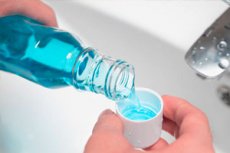Nye publikasjoner
Alkoholholdig munnvann kan forstyrre munnens mikrobiom og forårsake tannkjøttsykdom og kreft
Sist anmeldt: 02.07.2025

Alt iLive-innhold blir gjennomgått med medisin eller faktisk kontrollert for å sikre så mye faktuell nøyaktighet som mulig.
Vi har strenge retningslinjer for innkjøp og kun kobling til anerkjente medieområder, akademiske forskningsinstitusjoner og, når det er mulig, medisinsk peer-evaluerte studier. Merk at tallene i parenteser ([1], [2], etc.) er klikkbare koblinger til disse studiene.
Hvis du føler at noe av innholdet vårt er unøyaktig, utdatert eller ellers tvilsomt, velg det og trykk Ctrl + Enter.

Bruk av alkoholbaserte munnskyll kan øke risikoen for å utvikle tilstander som tannkjøttsykdom og visse kreftformer, inkludert kolorektal kreft.
Dette er resultatene av en studie utført ved Institutt for tropisk medisin i Antwerpen, Belgia, ledet av doktorgradsstudent Jolein Lauman fra Institutt for kliniske vitenskaper.
Studien ble publisert i Journal of Medical Microbiology.
I studien fant forskere betydelige endringer i sammensetningen og mengden av bakterier i deltakernes orale mikrobiome etter bruk av den alkoholbaserte munnskyllevannet Listerine Cool Mint.
To typer bakterier, Fusobacterium nucleatum og Streptococcus anginosus, ble funnet å øke betydelig etter daglig bruk av munnskyllevannet. Disse bakteriene har vært knyttet til flere sykdommer, inkludert tannkjøttsykdom, spiserørskreft og tykktarmskreft.
Forskere bemerket også en nedgang i antall bakterier av slekten Actinobacteria.
Forskerne samlet ikke inn informasjon om deltakernes spisevaner eller røykestatus. De anbefalte heller ikke at publikum skulle slutte helt å bruke alkoholbaserte munnskyll.
Deltakerne brukte Listerine munnskyll i tre måneder og deretter et alkoholfritt munnskyll i tre måneder, eller omvendt.
Målet med studien var å finne måter å redusere forekomsten av gonoré, klamydia og syfilis hos menn som har sex med menn.
Alkoholbasert munnskyll vs. alkoholfri munnskyll
Ifølge Alliance Dental inneholder de fleste munnskyllevann som selges på apotek alkohol. Disse munnskyllevannene kan forårsake en kortvarig brennende følelse i munnen, en ubehagelig smak og tørr munn.
Alkohol ødelegger også nesten alle bakterier i munnen – både gode og dårlige.
Alkoholfritt munnskyll dreper ikke alle bakterier, men det skaper en ny balanse av bakterier i munnen din.
Forskerne sa at personer med problemer med munntørrhet, som pasienter som gjennomgår strålebehandling, tar visse medisiner, eller har medisinske tilstander som diabetes eller Sjøgrens syndrom, kan foretrekke en alkoholfri skylling. Personer med en historie med alkoholavhengighet og de med omfattende tannrestaureringer kan også foretrekke en alkoholfri skylling.
«Alkoholbaserte munnskyll er allment tilgjengelige», sa Lauman i en pressemelding. «Publikum kan bruke dem daglig for å bekjempe dårlig ånde eller forebygge periodontal sykdom, men bør være klar over de potensielle konsekvensene. Ideelt sett bør langvarig bruk gjøres under veiledning av helsepersonell.»
Bør du bruke munnskyll basert på alkohol?
Forskere rapporterte at bruk av det alkoholbaserte munnskyllet Listerine var assosiert med økte nivåer av opportunistiske bakterier som kan øke risikoen for periodontal sykdom, spiserørs- og kolorektalkreft og systemiske sykdommer.
«Vi fant ut at Listerine Cool Mint hadde en negativ innvirkning på noen gunstige bakterier», sa Chris Kenyon, PhD, professor ved Institute of Tropical Medicine og en av forfatterne av studien. «For eksempel reduserte det antallet bakterier i rekken Actinobacteria. Ulike Actinomyces-arter er en del av de orale nitratreduserende bakteriene, som omdanner spyttnitrat til nitritt for å danne det kraftige vasodilatoriske nitrogenoksidet, som er viktig for å opprettholde normalt blodtrykk. Nitrat-nitritt-nitrogenoksid-veien er en viktig mekanisme som knytter det orale mikrobiomet til kardiovaskulær helse.»
Forfatterne bemerker at regelmessig bruk av Listerine bør gjøres med forsiktighet og nøye overveielse.
«Det [alkoholbasert munnskyll] kan være trygt å bruke i korte perioder, men basert på våre funn og andre data, vil jeg ikke anbefale langvarig bruk», sa Kenyon til Medical News Today.
Imidlertid sier minst én ekspert at det er viktig å huske at munnvann ikke direkte forårsaker kreft.
«Munnskyll med alkohol kan være en medvirkende faktor hvis en person også røyker, drikker alkohol eller spiser et usunt kosthold, men studier tyder ikke på at det er den eneste årsaken til kreft. Det krever også langvarig bruk», sa Dr. Eric Asher, en primærlege ved Northwell Lenox Hill Hospital i New York City.
«Hvilken type munnvann som bør brukes, bestemmes av spesifikke tannbehov, som kan diskuteres ved en tannundersøkelse som skjer to ganger i året. Dette bestemmes basert på emaljens tilstand (laget som beskytter tennene) og tennenes generelle helse», la Asher til, som ikke var involvert i studien.
«Forskerne understreker at studiens funn ikke betyr at publikum bør slutte å bruke munnvann helt», la han til.
Begrensninger i munnvanns- og kreftstudien
Studien hadde flere begrensninger.
Oral prøvetaking var begrenset til ganebuene og den bakre orofarynx. Forfatterne bemerker at resultatene kanskje ikke er representative for hele munnhulen. Etterlevelse av bruk av munnvann ble ikke kontrollert. Endringene ble ikke bekreftet med en annen metode. Studien inkluderte kun menn som har sex med menn. Derfor er resultatene kanskje ikke generaliserbare til hele populasjonen.
